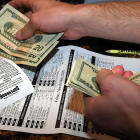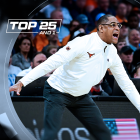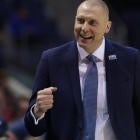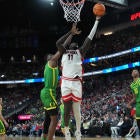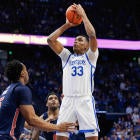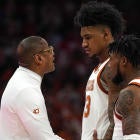CBS Sports has a picks and projections site called SportsLine. Its picks are powered by advanced computer simulations and sports insiders, experts, and former bookmakers. Visit SportsLine now for full details.
The NCAA Tournament has, for decades, existed as a high holy three-week-long holiday for pro and amateur gamblers alike.
Monday's decision by the Supreme Court to allow legalized sports betting on a state-by-state basis just made the Big Dance even bigger. Potentially gargantuan. The NCAA Tournament -- which, from a gambling perspective, only has a rival in the totality of the NFL Playoffs; the tournament easily outpaces the Super Bowl when it comes to money wagered -- is a unique American sports viewing experience. It's also a unique American gambling endeavor. The two go hand in hand.
Now the table is set for millions of Americans to make bets, be it in person or on their phones, through legal means on the big bracket.
That means big business ahead for a lot of people. A number of states (Delaware, Connecticut, New Jersey, Pennsylvania and West Virginia, for starters) are expected to be operational for months before next year's tournament gets underway.
And for all the (mostly positive) response the Supreme Court's 7-2 vote in favor of New Jersey, and against the Professional and Amateur Sports Protection Act (PASPA), has received it's still hard to envision just how big of a decision this could wind up being decades from now. Sports are constantly evolving, but seldom with the help of federal bodies. This is a watershed, if not long overdue, verdict.
"Congress can regulate sports gambling directly, but if it elects not to do so, each State is free to act on its own," Justice Samuel Alito writes in Monday's ruling. "Our job is to interpret the law Congress has enacted and decide whether it is consistent with the Constitution. PASPA is not."
A law that had stood for 25 years is eradicated. The embargo on betting outside the state of Nevada is no more. Legalized betting on sports is on its way.
So if we're going to discuss the broader impact of sports betting the United States, we have to discuss the NCAA Tournament. Millions of people love the NCAA Tournament and watch it every year. Millions more follow it because of the simple, irresistible beauty of what the tournament, in its very form, necessitates: a bracket. Brackets beget gambling, which begets interest, which is compounded when more people are casually allowed to log picks on their phones or make bets at a local window.
For many who have participated in large-sum office pools or logged bets through offshore sites and/or bookies, the function of the NCAA Tournament experience will not change. The hardcores will continue in step. So what changes? Well, Monday's ruling takes gambling out of the shadows. It removes the taboo, and more importantly the law (local legislation pending), against betting. Simply put: the Supreme Court just voted to mainstream betting enterprises on pro and college sports.
And so change will come in how the NCAA Tournament is covered and, subsequently, consumed by millions of sports fans. For as big as the tournament has been, and how it's evolved not only in the number of teams involved but how it's covered, Monday's news promises to make it even bigger.
Many who watch sports don't bet on them. That will continue to be the case. But more and more in recent years, the business of sports, and the coverage of it, have leaned in on the gambling aspect. Be it with references to game lines or daily fantasy ventures, the reality of gambling being inherent to the sports viewing experience has become accepted -- even expected. A betting sports fan is a hungry sports fan is a wanting-to-be-smarter sports fan.
On this very site and through our over-the-top streaming services, we do a nightly preview show on CBS Sports HQ that focuses not just on the games, but on daily fantasy picks and wagering on games. Betting on sports has become inherent for so many who watch them. It brings another level of enjoyment (and yes, obviously enticement) to sports.
Wagering breeds a lot of things, but most predominantly, it breeds interest and, by definition, personal investment.
The NCAA, which is already dealing with a mountain range of philosophical obstacles, just witnessed a continent emerge from the underworld. How it deals with this new reality will be interesting to track, but those issues aside, the NCAA Tournament is set to become more nationally popular because it will be even more localized. You could have scenarios in which the NCAA Tournament is holding games in states where betting is legal, and even if the NCAA doesn't allow in-arena betting, fans could log their bets on their phones or at brick-and-mortar parlors 50 yards away.
That sort of circumstance will draw more people to track the games and bet on their brackets. It's inevitable. How do we know? Take this tweet from the NCAA on Monday morning as evidence. The statement indicates an immediate acceptance from the NCAA that runs counter to prior response behavior. But therein lies the power of the Supreme Court.
NCAA statement on Supreme Court sports wagering decision: https://t.co/CbqyxJU0OM pic.twitter.com/7AsXUkPUr2
— NCAA (@NCAA) May 14, 2018
So ... the tournament is going to Vegas, then?
The ruling brings more attention and appeal to the sports world. For college basketball, its biggest event is bound to bloat. More and more, we're a sports culture that rallies around the big events. The tentpole stuff. The NCAA Tournament is a mainstage affair that owns an entire month on the calendar, after all.
When you introduce legal means to wager on the games, it only enhances the presentation. Media consumption, and media coverage, is sure to bring more attraction to the sport.
As it turns out, Monday's decision could go well beyond impacting sports, but if you're someone who enjoys the NCAA Tournament for everything that it is -- which is to say, among other things: a moneymaking spectacle; a champion-producing spectacular; a storytelling pageant; a heartbreaking but also spirit-reviving parade of results; five dozen shining moments inside of One Big Shining Moment; and a gambling supernova -- the fan experience for March Madness just changed exponentially forever.












